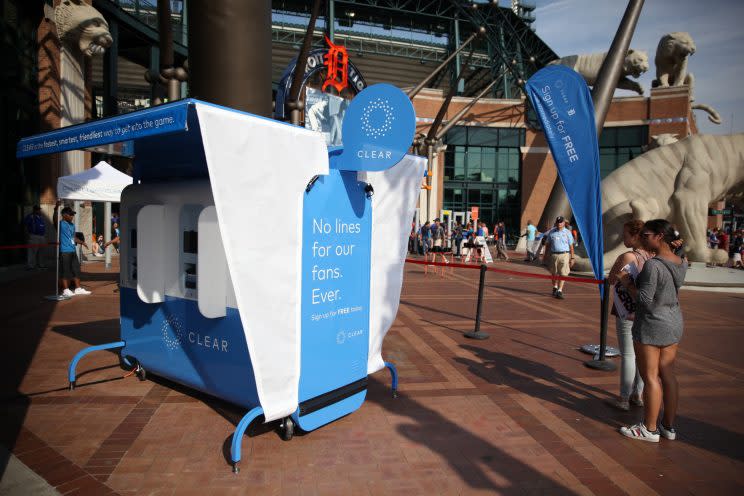Your fingerprint is now your baseball ticket at 6 ballparks
The fingerprint-entry system Clear, founded in 2003 to help airport travelers skip security lines, went out of business back in 2009. But perhaps it was simply a technology before its time: a group of investors bought the company in 2010 for $6 million, re-launched it, and now Clear is in 24 airports, six baseball parks, and one NBA arena.
Last week Clear launched at Comerica Park, home of the Detroit Tigers. It’s also at Coors Field in Denver (Rockies); Marlins Park in Miami; AT&T Park in San Francisco (Giants); Citi Field in New York (Mets); Yankee Stadium (home to the Yankees and, for now, the NYCFC soccer team); and American Airlines Arena, where the Miami Heat play. That’s seven sports venues, eight teams, six of them baseball.
At ballparks, Clear is free. The airport membership will run you $15 per month, or $180 per year; Clear recently hit 1 million registered members.
Clear is owned by privately held Alclear, and it now boasts more than $35 million in venture funding from investors including T. Rowe Price. Last year, Delta bought a 4% stake for an undisclosed amount not included in the $35 million total.
Caryn Seidman-Becker, a former hedge fund manager who has been Clear’s CEO since its rebirth in 2010, describes it this way: “We are the ATM of identity. You’re not taking stuff out of your wallet. We are your driver’s license. We are your ticket.”
More precisely: You are your ticket. Tap two fingers at a terminal, and you’re done. (At the airport, you scan your boarding pass, as well.) In some venues Clear is adding retinal scans to the fingerprinting.
To be sure, there are readers for whom terms like “fingerprinting” and “retinal scan” raise instant alarms about security and privacy. Asked what she’d say to any baseball fans or air travelers with hesitations about opting in to Clear for those reasons, Seidman-Becker answers, “We’ve really focused on building trust and security with our fans and customers.” Clear’s web site states, “We never sell or rent personal information about our consumers,” but also says, “We may share biometric data and other personal information… with service providers we have retained to perform services on our behalf.”
At a venue like Yankee Stadium, where long, snaking lines can form a full hour before a game, the appeal of registering for Clear is obvious. And the progression from airports to ballparks was natural, Seidman-Becker says, because, “At the end of the day, so many of these [sports] venues are looking like airports. Fifty percent of fans are coming within 30 minutes, so you need to create a secure, effective, efficient fan experience that looks a lot like an airport.”

Seidman-Becker sees possibilities for Clear in other industries besides air travel and sports events, and it’s easy to think of some of those areas: any live event that tends to create lengthy lines outside.
But first, Clear can do a lot more in sports—inside the arena.
The additional uses could include: speeding up the beer line; using your fingerprint to pay for merchandise instantly; using it to pay for food at your seat; or, a bit larger in scope, scale, and ambition: “You could use it for seat upgrades,” Seidman-Becker says.
How would that work? She envisions a time when teams could be notified when a fan leaves the game early (that fan would likely have to scan on their way out, which may require some incentive for them), and the team could sell their seat a second time. Imagine: a sign outside the ballpark alerts lingering fans, who showed up looking for a ticket, that a seat has opened up for the final three innings at a steep discount.
For now, just making entry into the stadium faster is a major step. It’s a step that can help Major League Baseball bring fans to the games in person—which league officials, from commissioner Rob Manfred to Red Sox president Sam Kennedy, have repeatedly said is one of its top priorities these days.
—
Daniel Roberts is the sports business writer at Yahoo Finance. Follow him on Twitter at @readDanwrite.
Sportsbook is our sports business video series.
Read more:
MLB commissioner: ‘We are reexamining our stance on gambling’
Formula E CEO: ‘We are witnessing the electric revolution in the motor industry’
ESPN is doubling down on drone racing
U.S. Polo wants to shed the sport’s elitist image

